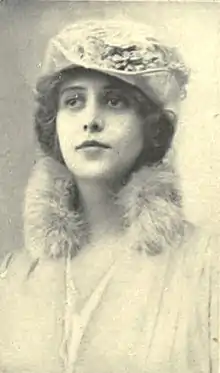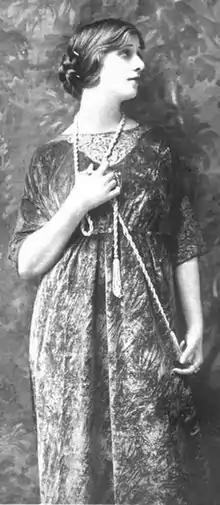Virginia Fox Brooks | |
|---|---|
 Virginia Fox Brooks, from a 1916 publication. | |
| Born | January 29, 1893 |
| Died | 1971 (aged 77–78) |
| Nationality | American |
| Other names | Virginia Fox-Brooks Vernon, Virginia Vernon (after marriage) |
| Occupations |
|
| Known for | Chief Welfare Officer, ENSA, during World War II |
| Notable work | translations of works by Noel Coward |
Virginia Fox Brooks MBE (January 29, 1893 – 1971), also known as Virginia Fox-Brooks Vernon or Virginia Vernon, was an American actress, playwright, translator, and journalist. With her husband, Frank Vernon, she translated dramatic works into English. During World War II, she worked with the Entertainment National Service Association (ENSA) to produce shows for the troops.

Early life
Virginia Fox Brooks was born January 29, 1893,[1] the daughter of Joseph Brooks, a theatre manager.[2][3] (Some sources give her birthdate as 1894 or 1899.) Her parents were from Tennessee and Virginia.[4] She studied music in France with Jacques Isnardon at the Paris Conservatory,[5] and toured in Europe with singer Yvette Guilbert as a young woman.[6] "If I ever do anything really fine," Brooks said of Guilbert in 1919, "I feel that I shall owe it to her, to the privilege of daily association with so marvelous an artist, to all that I have learned through my intimate friendship with her."[1]
Stage and writing
Fox Brooks sang at the Opéra-Comique in Paris. She appeared on Broadway in The Adventures of Lady Ursula (1915),[7] Trilby (1915), Ghosts (1915), The Great Lover (1915–1916),[8] Getting Married (1916-1917),[9] Sinbad (1918–1919),[10] and The Passing Show of 1918.[11][12] She also appeared in the London productions of The Great Lover (1920–1921),[13][14] and The Love Match (1922).[15]
With her husband, Frank Vernon, she co-wrote the English versions of French and Russian plays, including Simon Gantillon's Maya (1928),[16] René Berton's After Death (1928),[17] Vladimir Kirshon's Red Rust (1930),[18] Alfred Savoir's Little Catherine (1931), The Poet's Secret (1933), Henry Bordeaux's Shattered (1935),[19][20] Quet's (1935),[21] and Sacha Guitry's Villa for Sale (1963). She also adapted Journey's End into French with Lucien Besnard (1930),[22] Laurence Housman's Victoria Regina (1937) into French with André Maurois,[23] and translated Noel Coward's Private Lives into French in 1933, and she went on to translate other works by Coward, including Blithe Spirit.[24][25]
The Vernons co-wrote The Diary of a Murderer (1934, based on Tristan Bernard's Aux Abois), and co-edited Modern One-Act Plays from the French (1935).[26] Other books by Virginia Vernon included Beauty Products (a novel), Parcel Parade (1939, another novel),[27][28] and Enchanting Little Lady (1964, a biography).[29][30]
World War II and after
Vernon's husband died early in World War II, in France. During the war she was involved in organizing entertainment for the troops as Chief Welfare Officer with ENSA,[31][32] and traveled extensively, from India, China, and Thailand to Iceland, Tunisia, and Egypt.[33] She landed at Normandy soon after D-Day. For her war work, she was given an MBE, as well as five campaign medals.[25]
In 1947 she wrote about Canadian topics for the Daily Mirror.[34] She judged and spoke at a regional drama festival in Quebec that year,[35] and became a member of the Société des Auteurs et Compositeurs Dramatiques.[36] In 1950 and 1951 she reported on fashion news from Paris.[37][38][39]
Personal life
Virginia Fox Brooks married British theatrical producer Frank Vernon in 1925, as his second wife.[40] She was widowed when Frank died in 1940, in France.[41] Some of her papers are in the Imperial War Museum Department of Documents.[31]
References
- 1 2 "How Virginia Fox Brooks Came to the Stage". The Boston Globe. June 15, 1919. p. 53. Retrieved October 3, 2019 – via Newspapers.com.
- ↑ "Joseph Brooks, Memphis Theatre Manager". Historic Memphis. Retrieved October 3, 2019.
- ↑ "Jos. Brooks Killed in 8-Story Fall". The Brooklyn Daily Eagle. November 27, 1916. p. 1. Retrieved October 3, 2019 – via Newspapers.com.
- ↑ "Falls or Jumps Eight Stories". The Baltimore Sun. November 28, 1916. p. 1. Retrieved October 3, 2019 – via Newspapers.com.
- ↑ "Virginia Fox Brooks". The South Bend Tribune. October 30, 1919. p. 6. Retrieved October 3, 2019 – via Newspapers.com.
- ↑ "In the Spotlight". Theatre Magazine. 23: 21. January 1916.
- ↑ "Maxine Elliott's". The Theatre. Meyer Bros. & Company. 1915. p. 172.
- ↑ "Worn by Virginia Fox Brooks in 'The Great Lover'". Women's Wear Daily. 11: 16. November 26, 1915 – via ProQuest.
- ↑ "Virginia Fox Brooks and Hugh Dillman in the stage production Getting Married". NYPL Digital Collections. Retrieved October 3, 2019.
- ↑ Everett, William A.; Laird, Paul R. (November 12, 2015). Historical Dictionary of the Broadway Musical. Rowman & Littlefield. p. 323. ISBN 9781442256699.
- ↑ Hischak, Thomas S. (April 22, 2009). Broadway Plays and Musicals: Descriptions and Essential Facts of More Than 14,000 Shows through 2007. McFarland. pp. 163, 178. ISBN 9780786453092.
- ↑ "Winter Garden". The Theatre. 28: 144. 1918.
- ↑ "Virginia Fox Brooks Leaves". New York Clipper. November 24, 1920. p. 13. Retrieved October 3, 2019 – via Illinois Digital Newspaper Collections.
- ↑ Wearing, J. P. (March 27, 2014). The London Stage 1920-1929: A Calendar of Productions, Performers, and Personnel. Rowman & Littlefield. p. 52. ISBN 9780810893023.
- ↑ "Untitled news item". New York Herald. February 12, 1922. p. 40. Retrieved October 3, 2019 – via Newspapers.com.
- ↑ Vernon, Virginia; Gantillon, Simon; Vernon, Frank; Hughes-Stanton, Blair (1930). Maya: A play. Waltham Saint Lawrence, [Eng.]: Golden Cockerel press.
- ↑ Wearing, J. P. (March 27, 2014). The London Stage 1920-1929: A Calendar of Productions, Performers, and Personnel. Rowman & Littlefield. pp. 564, 594, 654. ISBN 9780810893023.
- ↑ Kirshon, Vladimir Mikhaĭlovich; Vernon, Frank; Vernon, Virginia (Fox-Brooks); Uspenskii, AndreiÌ VasileÌvich (1930). Red rust. New York: Brentano's.
- ↑ Wearing, J. P. (May 15, 2014). The London Stage 1930-1939: A Calendar of Productions, Performers, and Personnel. Rowman & Littlefield. pp. 162, 287, 416–417. ISBN 9780810893047.
- ↑ "The best one-act plays of 1933 / selected by J.W. Marriott. Marriott, J. W. (James William), 1884-1953". Bibliothèque Famille Bleviss. Retrieved October 3, 2019.
- ↑ Office, Library of Congress Copyright (1936). Catalog of Copyright Entries. New Series: 1935. Copyright Office, Library of Congress. p. 536.
- ↑ "Journey's End Playing Two Paris Theaters". The Baltimore Sun. January 26, 1930. p. 56. Retrieved October 3, 2019 – via Newspapers.com.
- ↑ Housman, Laurence; Vernon, Virginia Fox-Brooks; Maurois, André (1937). Victoria Regina; comédie en quatre actes et douze tableaux. Petite illustration.no. 823, 22 mai 1937. Thấtre [nouv. sér.] no. 414. Paris: L'Illustration].
- ↑ "Paris to See 'Private Lives'". The San Francisco Examiner. August 6, 1933. p. 51. Retrieved October 3, 2019 – via Newspapers.com.
- 1 2 Hunter, Izaak (February 1, 1947). "With Rod and Gun; A Fishing Story to Look Forward to". The Gazette. p. 17. Retrieved October 3, 2019 – via Newspapers.com.
- ↑ Vernon, Virginia (Fox-Brooks); Vernon, Frank (1935). Modern one-act plays from the French. London: G. Allen & Unwin ltd.
- ↑ "Advertisement". The Observer. October 22, 1939. p. 7. Retrieved October 3, 2019 – via Newspapers.com.
- ↑ Vernon, Virginia (1939). Parcel Parade. London.
- ↑ Niven, Alexander C. (September 10, 1964). "Between Book Ends". St. Louis Post-Dispatch. p. 30. Retrieved October 3, 2019 – via Newspapers.com.
- ↑ Vernon, Virginia (1964). Enchanting Little Lady.
- 1 2 Catalogue Description, Papers of Mrs. Virginia Vernon, Imperial War Museum Department of Documents.
- ↑ "British Film Unit; Narrow Escape in France". Nambour Chronicle and North Coast Advertiser. August 23, 1940. p. 9. Retrieved October 3, 2019 – via Trove.
- ↑ "Newswoman Visits Canada". Times Colonist. December 3, 1946. p. 9. Retrieved October 3, 2019 – via Newspapers.com.
- ↑ Powell, Leslie C. (December 6, 1946). "Virginia Vernon is to Study the Mannerisms of Canadians". The Gazette. p. 3. Retrieved October 3, 2019 – via Newspapers.com.
- ↑ Whittaker, Herbert (March 29, 1947). "Festival Conclusions; Virginia Vernon's Comments Point Up Weakness of Local Little Theatre". The Gazette. p. 6. Retrieved October 3, 2019 – via Newspapers.com.
- ↑ "Virginia Vernon to Adjudicate Regional Drama Festival Here". The Gazette. March 15, 1947. p. 7. Retrieved October 3, 2019 – via Newspapers.com.
- ↑ Vernon, Virginia (January 25, 1950). "Secrets of Fashion in Undress and Undies". The Argus. p. 10. Retrieved October 3, 2019 – via Trove.
- ↑ Vernon, Virginia (February 12, 1951). "Dior Opens Show With Dance". The Argus. p. 7. Retrieved October 3, 2019 – via Trove.
- ↑ Vernon, Virginia (January 26, 1951). "Paris Shoe Style Craze". The Argus. p. 10. Retrieved October 3, 2019 – via Trove.
- ↑ "Frank Vernon, Theatrical Producer, Dead". The Burlington Free Press. March 21, 1940. p. 28. Retrieved October 3, 2019 – via Newspapers.com.
- ↑ "Frank Vernon". IMDb. Retrieved October 3, 2019.
External links
- Virginia Fox Brooks at the Internet Broadway Database
- A photograph of Virginia Fox Brooks in the Billy Rose Theatre Collection Photograph File, New York Public Library Digital Collections.